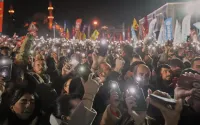 Melanoma can be fatal |
18 Juhe 2008
The 52-year-old man involved was free of melanoma two years after treatment.
US researchers, reports the New England Journal of Medicine, took cancer-fighting immune cells, made five billion copies, then put them all back.
Scientists in the UK warned that further trials would need to be done to prove how well the treatment worked.
The body's immune system plays a significant role in the battle against cancer, and doctors have been looking for ways to boost this tumour-killing response.
The 52-year-old man had advanced melanoma which had spread to the lungs and lymph nodes.
Scientists at the Fred Hutchinson Cancer Research Center in Seattle concentrated on a type of immune system cell called a CD4+ T cell.
From a sample of the man's white blood cells, they were able to select CD4+ T cells which had been specifically primed to attack a chemical found on the surface of melanoma cells.
These were then multiplied in the laboratory, and put back in their billions to see if they could mount an effective attack on the tumours.
Two months later, scans showed the tumours had disappeared, and after two years, the man remained disease-free.
The new cells persisted in the body for months after the treatment.
'Immune power'
While claiming this as a world first, the study authors pointed out that their technique applied only to a patient with a particular type of immune system and tumour type, and could work for only a small percentage of people with advanced skin cancer.
Dr Cassian Yee, who led the project, said: "For this patient we were successful, but we would need to confirm the effectiveness of therapy in a larger study."
Professor Karol Sikora, a cancer expert at Imperial College in London, described the research as "pretty exciting" with potentially wide application.
He said the researchers had focused on melanoma because the disease was well understood compared with other cancers, but other cancers could potentially be targeted.
He said: "I think we will be able to harness the power of the immune system. Eventually we will learn how to control cancer, in other words we will suppress it.
"Patients will live with their cancer, and die with their cancer, but not of their cancer - it will be like diabetes today."
A spokesman for Cancer Research UK also said more research would be needed, adding: "This is another interesting demonstration of the huge power of the immune system to fight some types of cancer.
"Although the technique is complex and difficult to use for all but a few patients, the principle that someone's own immune cells can be expanded and made to work in this way is very encouraging for the work that ourselves and others are carrying out in this field."






